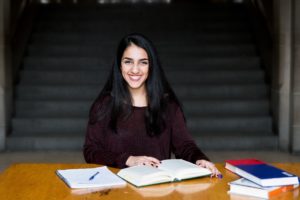First-year English and international relations student Sayeh Yousefi wants to help the world. A Munk One student and one of the University of Toronto’s four 2016 Loran scholars, Yousefi is using her talents to contribute to a greater good. From volunteering with Oxfam to writing for The Pavlovic Today, Yousefi tells us how her desire to help people better understand one another drives all of her pursuits.
How does it feel to be one of only four 2016 Loran scholars at U of T?
It’s a life-changing experience. I wouldn’t have discovered the Munk One program without it, and Munk One is one of the reasons I came to U of T. It has definitely been one of the most defining academic experiences of university so far.
What are your research interests?
I grew up in the Middle East and as a woman of a minority religion; I’ve always been interested in looking at Middle Eastern politics and conflict. I’m also really passionate about women’s rights and social justice issues. I’ll probably pursue something related to social justice and its relation to conflict in the Middle East.
Describe your big “a-ha” moment.
I was 16 and had spent two weeks at Yale University in the Yale Young Global Scholars program. I was surrounded by some of the most incredible and bright kids from around the world; some of whom I knew would be incredible leaders in the future. Being around such impressive students made me start thinking about what I could do to make myself a more competitive college applicant. But at one point, I had an epiphany of sorts where I realized I should think less about what would look best on a college application and think more about what I could do to help the world.
I sat down and thought through everything I had done throughout high school and I questioned whether I had been doing them to make myself a more competitive applicant or whether these were things I was really passionate about. Through this process, I realized there were lots of different ways I could help the world. That’s why I work with Oxfam. Their mission is to alleviate poverty by empowering women — it’s a great NGO that corresponds with my values.
Who has influenced you most in life and why?
My mom. She always put an emphasis on education throughout my life and that shaped me. I attribute the person I am today to my mom’s continued emphasis on pursuing an education and following what I’m passionate about.
Hers is not a sad story, but it is a difficult one — she grew up in the Middle East during the Iranian Revolution, was discriminated against for practicing a minority religion and, as a medical student, witnessed the effects of chemical warfare. She moved her family out of Iran, came to Canada as a dentist with a doctorate and realized, through a complicated process, that she couldn’t get her Canadian dentistry certificate. She and my dad, a ship captain, started a sports bar to earn a living. They did what they had to do to support the family.
What impact do you want to have on the world or your local community?
I think today’s world is pretty divided. I don’t think fixing it will be as simple as waving a wand and saying, “let there be peace!” But having experienced very different cultures, I am keen on appreciating and trying to understand other people. I don’t quite yet know what I’d like to pursue, but whatever it is, I hope it helps improve cross-cultural understanding.
That’s part of the reason I write for The Pavlovic Today. They really promote having an uncensored and globally diverse voice. It’s important to see and understand what life is like for someone else. Understanding is a driving factor of peace, and I believe that writing and journalism are some of the best tools for improving cross-cultural understanding.
What is your personal philosophy?
Do whatever you can to help other people. If you have the opportunity to improve someone’s life or community, do whatever you can to see that through.
March 20, 2017
